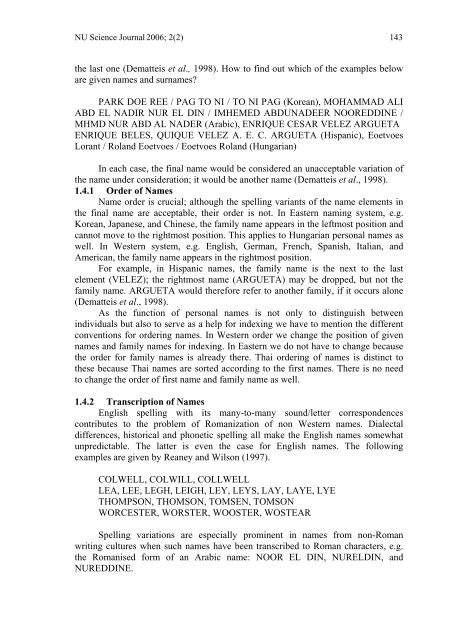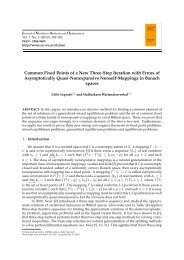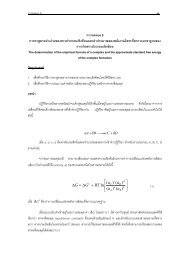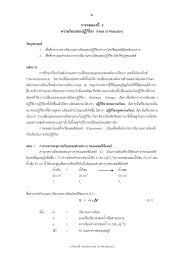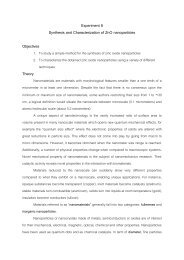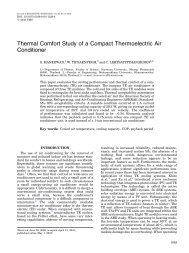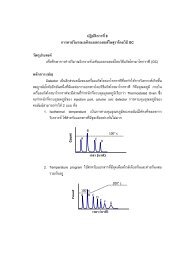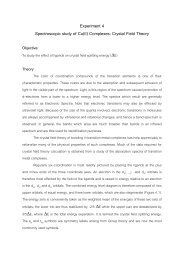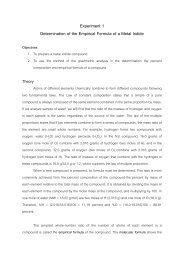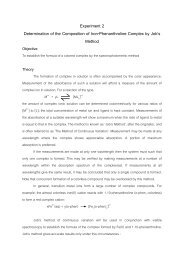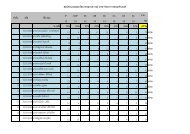Hybrid Name Matching Methods for Rule Based ... - ResearchGate
Hybrid Name Matching Methods for Rule Based ... - ResearchGate
Hybrid Name Matching Methods for Rule Based ... - ResearchGate
Create successful ePaper yourself
Turn your PDF publications into a flip-book with our unique Google optimized e-Paper software.
NU Science Journal 2006; 2(2) 143<br />
the last one (Dematteis et al., 1998). How to find out which of the examples below<br />
are given names and surnames?<br />
PARK DOE REE / PAG TO NI / TO NI PAG (Korean), MOHAMMAD ALI<br />
ABD EL NADIR NUR EL DIN / IMHEMED ABDUNADEER NOOREDDINE /<br />
MHMD NUR ABD AL NADER (Arabic), ENRIQUE CESAR VELEZ ARGUETA<br />
ENRIQUE BELES, QUIQUE VELEZ A. E. C. ARGUETA (Hispanic), Eoetvoes<br />
Lorant / Roland Eoetvoes / Eoetvoes Roland (Hungarian)<br />
In each case, the final name would be considered an unacceptable variation of<br />
the name under consideration; it would be another name (Dematteis et al., 1998).<br />
1.4.1 Order of <strong>Name</strong>s<br />
<strong>Name</strong> order is crucial; although the spelling variants of the name elements in<br />
the final name are acceptable, their order is not. In Eastern naming system, e.g.<br />
Korean, Japanese, and Chinese, the family name appears in the leftmost position and<br />
cannot move to the rightmost position. This applies to Hungarian personal names as<br />
well. In Western system, e.g. English, German, French, Spanish, Italian, and<br />
American, the family name appears in the rightmost position.<br />
For example, in Hispanic names, the family name is the next to the last<br />
element (VELEZ); the rightmost name (ARGUETA) may be dropped, but not the<br />
family name. ARGUETA would there<strong>for</strong>e refer to another family, if it occurs alone<br />
(Dematteis et al., 1998).<br />
As the function of personal names is not only to distinguish between<br />
individuals but also to serve as a help <strong>for</strong> indexing we have to mention the different<br />
conventions <strong>for</strong> ordering names. In Western order we change the position of given<br />
names and family names <strong>for</strong> indexing. In Eastern we do not have to change because<br />
the order <strong>for</strong> family names is already there. Thai ordering of names is distinct to<br />
these because Thai names are sorted according to the first names. There is no need<br />
to change the order of first name and family name as well.<br />
1.4.2 Transcription of <strong>Name</strong>s<br />
English spelling with its many-to-many sound/letter correspondences<br />
contributes to the problem of Romanization of non Western names. Dialectal<br />
differences, historical and phonetic spelling all make the English names somewhat<br />
unpredictable. The latter is even the case <strong>for</strong> English names. The following<br />
examples are given by Reaney and Wilson (1997).<br />
COLWELL, COLWILL, COLLWELL<br />
LEA, LEE, LEGH, LEIGH, LEY, LEYS, LAY, LAYE, LYE<br />
THOMPSON, THOMSON, TOMSEN, TOMSON<br />
WORCESTER, WORSTER, WOOSTER, WOSTEAR<br />
Spelling variations are especially prominent in names from non-Roman<br />
writing cultures when such names have been transcribed to Roman characters, e.g.<br />
the Romanised <strong>for</strong>m of an Arabic name: NOOR EL DIN, NURELDIN, and<br />
NUREDDINE.


